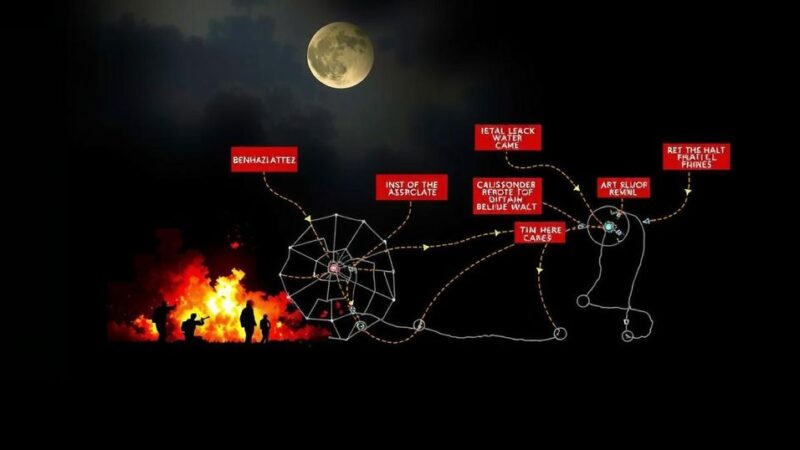The ongoing violence in the Middle East, specifically the conflict affecting Gaza and Lebanon, is likely to influence U.S. electoral dynamics as the presidential election approaches on November 5. With Arab Americans increasingly disillusioned with President Biden, there is a growing inclination among this demographic towards voting for Trump. As Netanyahu maneuvers politically, the impact of these international conflicts on U.S. voting patterns in swing states could shift the electoral landscape significantly.
As the conflict in the Middle East continues to escalate, particularly following the October 7 attacks on Israel, the ramifications are extending beyond the region into the political landscape of the United States. Significant military engagements and missile strikes have occurred, including Iran’s launch of nearly 200 missiles towards Israel and Israel’s operations against Hezbollah and Hamas. The recent assassination of key Hezbollah leaders by Israeli forces further complicates the situation, along with limited military incursions into Lebanon by Israel. Despite ongoing diplomatic efforts from Washington to establish a ceasefire, progress has been impeded, particularly following the assassination of Hamas leader Ismail Haniyeh. The political maneuvers by Israeli Prime Minister Benjamin Netanyahu seem oriented towards influencing the forthcoming U.S. elections, with speculation that he is favoring a Trump presidency which he perceives could be more aligned with Israeli interests than the current Biden administration. In elections nearing November 5, President Biden finds that expectations for a political victory in relation to the Middle East conflict are dim. Historically, many Arab Americans have leaned towards the Democratic Party, yet recent opinions show a shift. Polling indicates that a significant fraction of Arab Americans cite the conflict in Gaza as a primary concern, with approximately 60% ranking it as a critical issue influencing their voting preferences. Moreover, a substantial proportion expresses favorable views towards Trump over Biden, particularly due to dissatisfaction with the Biden administration’s approach to the humanitarian crises resulting from the ongoing conflict. Simultaneously, Jewish Americans traditionally support the Democratic Party; however, emerging trends among Arab Americans signify potential shifts in voting behavior that could impact key swing states such as Michigan and Pennsylvania. This electoral division highlights the intricate dynamics at play, with a substantial percentage of Arab Americans dissatisfied with both major party candidates but more closely aligning against Biden in light of his policies. Given these circumstances, the potential for Arab American voter sentiment to sway the outcome of the election could be significant. Recognizing that Netanyahu’s aggressive stance may inadvertently bolster Trump’s electoral standing complicates the narrative further, as it entwines foreign policy with domestic electoral strategies. Overall, as the Middle East conflict deepens, it becomes increasingly evident that its implications reach far beyond regional borders, directly shaping the political attitudes and electoral outcomes within the United States.
The ongoing conflict in the Middle East, particularly following the October 7 attacks on Israel, has significant repercussions for U.S. politics, especially with the presidential election approaching on November 5. The situation involves escalating military confrontations between Israel and groups such as Hamas and Hezbollah, as well as broader geopolitical strategies involving Iran. The potential influence of these international issues on voter sentiment, particularly among Arab Americans in swing states, has raised concerns about the Democratic Party’s standing in the upcoming election. Historically, Arab Americans have aligned with the Democratic Party, yet recent events and Biden’s policies regarding the conflict have led to increasing discontent among these voters, threatening to shift their support towards Trump or alternative candidates. Additionally, Netanyahu’s strategies and his possible preference for a Trump presidency further complicate this dynamic, suggesting that international affairs may play a key role in shaping domestic voting behavior.
In conclusion, the escalating conflict in the Middle East is not only a humanitarian crisis but also a potential game-changer for the upcoming U.S. elections. As Arab Americans grapple with the ramifications of current U.S. foreign policy, their shifting sentiments may lead to unexpected outcomes that could tilt voter preferences in swing states. The strategic calculations by Netanyahu seem poised to capitalize on Biden’s vulnerabilities, positioning Trump favorably within this electoral context. Ultimately, the intertwining of foreign and domestic politics exemplifies the multifaceted nature of this electoral cycle.
Original Source: theconversation.com






